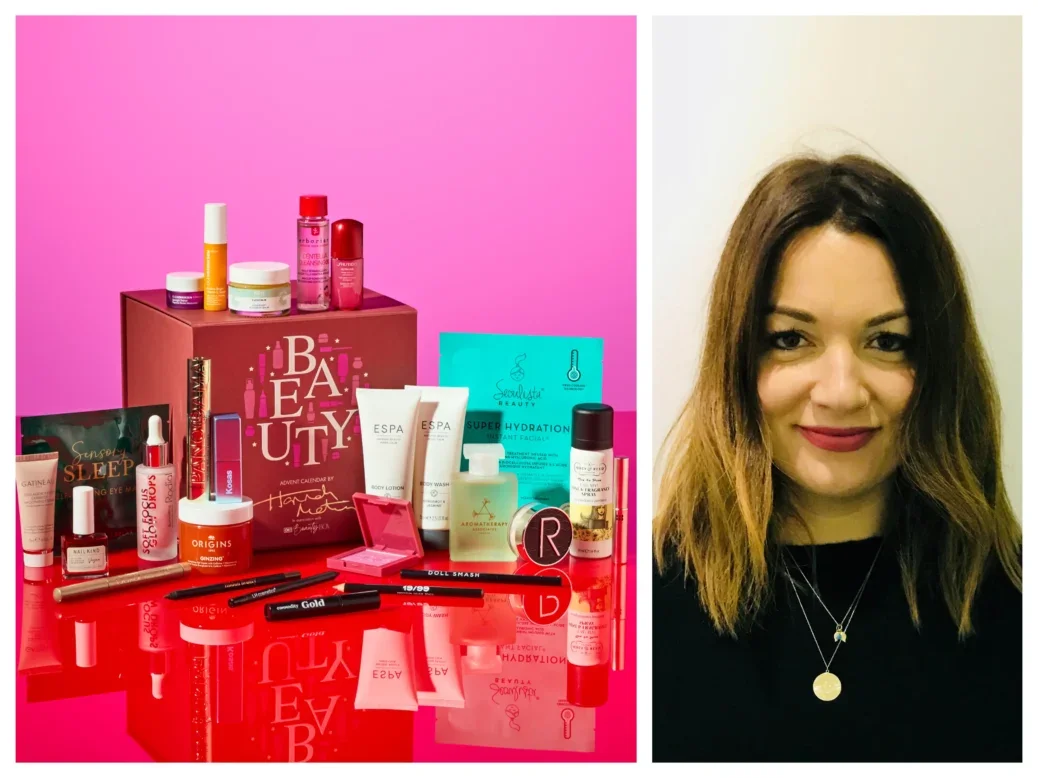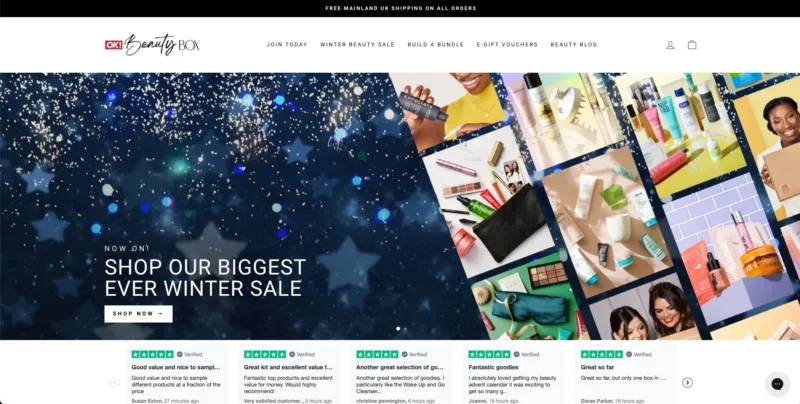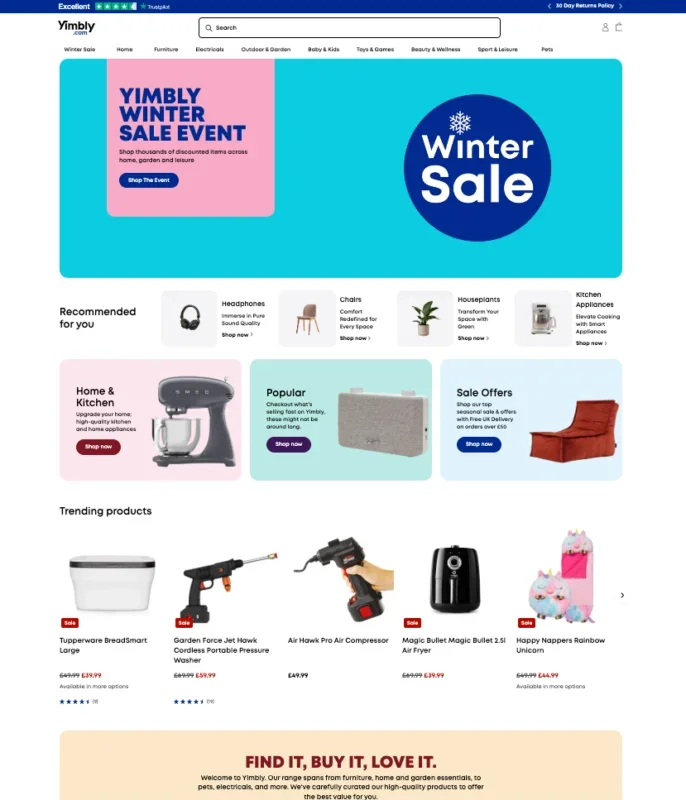
Mirror and Express publisher Reach doesn’t say it wants to be the next Amazon, but it would like to sell you an air fryer.
The company has expanded from affiliate marketing (taking commission on click-throughs to buy products on sites like Amazon) into direct sales – first with a beauty box product and now with a more wide-ranging online shop called Yimbly.
Launched in late 2020, the OK! Beauty Box is a package shipped each month to subscribers, each of which contains at least five beauty products with a claimed collective retail value of approximately £100. The subscription costs £15 a month, and the boxes also contain a copy of the most recent issue of OK! magazine.
In Reach’s half-year results in July, it said revenue from the Beauty Box had grown 34% year-on-year. The product is profitable, although Emma Oakley, Reach’s commercial director, told Press Gazette the margins are thin.
Oakley said: “It wasn’t launched to be a huge profit margin driver, it was launched for us as a new revenue stream…
“Beauty Box has been a real success story for us, because it’s an example of us diversifying revenue at Reach. I think we can get pigeonholed into being just a press publisher, and we’re obviously a lot more than that, and this is a really good example of that.”
Reach reported a strong last quarter of 2024 with full year financial results set to be ahead of expectations.

To build on the success of the core subscription the company has since launched standalone, limited-edition Beauty Boxes that might spotlight specific brands, be curated in partnership with a celebrity or influencer or contain, in one case, healthy jams.
However the largest standalone beauty box Reach has offered is its Christmas advent calendar box: after an initial trial run in 2023, when the company sold 2,000 units, it sold 10,000 in the run-up to Christmas 2024. Oakley said the company is looking to sell even more of its 2025 calendars.
The boxes generally appear to be a success with customers. Oakley told Press Gazette: “If I’m having a bad day I log into Trustpilot,” where they have a score of 4.3 out of five from more than 7,000 reviews.
Oakley said capitalising on the OK! brand was “really useful in enabling us to launch. Launching an unknown brand is a lot harder. So that just gave us a couple of steps up, I think, at the beginning…
“Where it’s really useful is the celebrities and the influencers that want to get involved, because we can offer them something in OK! mag as well.”
Oakley estimated 30% of Beauty Box customers are Reach readers, in particular readers of OK!, while 70% come from elsewhere. “But we use our audience very much to drive the awareness of the brand, and then we’ll chase them around the internet, and they may convert elsewhere.
“I think they’re not necessarily used to purchasing on our site — we basically sow a seed with them on our network and then follow them around on Google Shopping.”
Yimbly, Reach’s new online marketplace
Last year Reach soft-launched Yimbly, an online shop allowing people to buy “curated” products across the home, furniture, electricals, garden, baby, toys, beauty, sport and pet accessories categories.
Oakley said the company was “trying to be mass market, and not be limited to just one brand audience”.
Other publishers already operate similar propositions: DMG Media’s Mailshop.co.uk, for example, provides a portal for buying home goods from beds to sofas, plants and books.
Oakley said that following on from earlier efforts in affiliate marketing, Reach had felt there was an opportunity to do more, so decided to create its own marketplace.

Reach uses its network of websites, and particularly their affiliate content, to direct people toward Yimbly. Oakley said “a huge part of the proposition” was that “we’re just another supplier” to Reach’s affiliate content team.
“We’re just another client, but they’ll be incentivised to include us in any of their roundups because we own Yimbly, so we own the whole revenue line, rather than just a percentage of a commission.”
Yimbly effectively acts a shop window for a number of suppliers selling everything from sheds to smartwatches. Because Reach is providing its partners with a completed order, rather than just a click, it can charge a far higher commission on sales than via the affiliate-marketing model. Reach also provides a customer service team to handle product queries and returns.
Staff offered discount at Reach online shop
Staff have also been encouraged to use the site as customers: Press Gazette understands Reach employees were offered 15% off purchases made through the website ahead of Christmas.
Reach plans to launch dedicated storefronts on Yimbly for its flagship newsbrands and awards event Pride of Britain.
The name Yimbly was invented despite Reach originally hoping to use a name “that was related to what it does”. Oakley said one suggestion was Stocked.
“But unfortunately, with our trademark lawyers, we were just advised to come up with a brand new name, because as a PLC, if there were any links to any other smaller companies, we would just look like a meal ticket to them.”
Oakley said there is a misconception in e-commerce that “you just throw something up online and it might sell. But it really, really doesn’t — you’ve got to really focus on the functionality and the user journey and how easy it is to manage the suppliers on the back end, because they’re all different suppliers we’ve got now”.
Oakley said she appreciated that for many people, their first question about Yimbly was whether Reach was trying to emulate Amazon.
“We don’t want to be the next Amazon,” she said. “But equally, Amazon doesn’t rule the world or control that whole market. There is a space for everybody.”
She likened Yimbly more to the websites of Next or Tesco, albeit without a focus on clothes or food.
“We are ensuring that there’s good reviews on our products, or we won’t be selling them,” Oakley said. “Nor would we write affiliate content if they don’t have good reviews. And we need to make sure we’ve got a good, competitive price, or we won’t feature them.
“So for us, it’s more about having a curated space that is good value for you. It’s not about showing them every product that’s available. It’s actually saying: if you want an air fryer, here are the five ones that we would recommend. And because we’re building that brand trust, we hope that they will like shopping from us.”
Oakley said of Amazon that she thought “people have become disenfranchised with them anyway, as they [did] with Uber — they don’t want to buy everything just from Amazon…
“So, yes, Amazon does sell some of what we sell. But e-commerce grows globally massively each year, so there’s no reason we just can’t have a little share of that.”
Email pged@pressgazette.co.uk to point out mistakes, provide story tips or send in a letter for publication on our "Letters Page" blog
